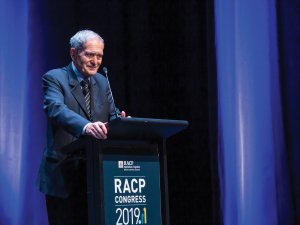Respiratory physician Lutz Beckert considers chronic obstructive pulmonary disease management, including the prevention of COPD, the importance of smoking cessation and pulmonary rehabilitation, and the lifesaving potential of addressing treatable traits. He also discusses the logic of inhaler therapy, moving from single therapy to dual and triple therapy when indicated, as well as other aspects of management
The mystery that is co-governance: When words go rampant and become meaningless
The mystery that is co-governance: When words go rampant and become meaningless

The term ‘co-governance’ has been tossed around with little clear understanding of what it means. Gabrielle Baker takes a deep dive
For the past year, at least, I have had just about weekly discussions – ranging from super casual to much more robust – about this mysterious thing called “cogovernance”.
While I admit to a passion for dry (to other people) government reports, and nothing interests me more than a political memoir from a minister that quotes large chunks of Parliament speeches straight from the Hansard record1, I have to say that many of the “co-governance” discussions bore me. Mostly this is because co-governance has become all things (good and bad) to everyone, to the point that in most contexts it has become entirely meaningless.
At the risk of being overly simplistic, we wouldn’t be talking about co-governance if there wasn’t interest in the Crown and its agencies doing a better job of being a Te Tiriti o Waitangi partner.
And, in doing so, the Crown is also seeking to do its governing role better, by drawing solutions from outside of its own conventional (and often already proven unsuccessful) processes.
Former minister for Treaty settlements, Chris Finlayson, has been public in his support for cogovernance recently, and as he puts it: “My attitude is, if central government has failed in so many areas, which it has, and if there are different ways of looking at issues that involve bringing iwi into decision-making, or handing over decision-making, then let’s give it a go.”2
What we mean by governance varies according to context. For example, at a national “State” level, governance usually includes how Parliament and the Government make decisions on how to use its powers and resources (including its money).
The success of this governance is determined by factors like absence of corruption, recognition and respect of human rights (and human rights-based values like equality), the collective gains from government activity (ie, the achievement of outcomes), operating according to the rule of law and implementation of open electoral processes.3
But usually when we use the term “co-governance” this is not what we are talking about – we usually mean some other kind of governance.
The health sector has a lot of experience of different meanings of governance, which fit into two main camps.
The first relates to the governing boards of health entities (eg, the Health Quality & Safety Commission) and the second to specific programmes of work (such as Hira, the National Health Information Platform led by the Ministry of Health).
In each case, governance is seen as part of setting the direction and making sure things happen as planned.
However, it is probably debatable how much actual influence these “governance groups” or boards have.
For example, we may all have different views on how much control former DHB members had over big decisions in relation to the health of their local populations, but we couldn’t dispute that it was hard, if not impossible, for them to make decisions in contravention of government policy or ministerial direction.
And, when it comes to governance of specific work programmes, the main decisions (such as whether the work should go ahead, deadlines, and budgets) have often already been made by ministers or senior officials.
In these situations, governance becomes a mechanism to ensure delivery of government milestones and goals, maybe translating government principles into meaningful actions, and ensuring all the various risks inherent in a policy, programme, or agency’s work, are properly dealt with.
Sharing the load of this kind of governance with other groups would seem like an easy win for government agencies but it is hard to see why groups such as iwi would sign up to it without any actual decision-making power.
So, what is co-governance?
When you search the internet for a definition of co-governance you mostly find articles and opinion pieces highlighting the need for a definition. The definitions that you do find largely relate to the governance and management of natural resources (for example, co-governance arrangements for the restoration of Te Waihora/Lake Ellesmere in the South Island).
But extrapolating from the examples of things labelled cogovernance, you can think of co-governance as two or more parties sharing responsibility for (or management of) resources at a local, regional, or central level. And legal academics have highlighted that in Aotearoa we usually mean co-management when we talk about co-governance.4
The difference between these two terms has been explained by the Office of the Auditor General in this way:
- Co-management is the collaborative process of decision-making and problem-solving within the administration of policy.
- Co-governance describes arrangements in which ultimate decision-making authority resides with a collaborative body exercising devolved power – where power and responsibility are shared between government and other stakeholders.5
To me, this seems to confirm our seemingly nationwide approach to using the term governance for just about every kind of decision-making.
One of the few certainties in life is that if a government agency or political party grasp onto a term and turn it into something it never was, it will go in and out of favour for reasons that have nothing to do with whether the term and its associated concept are achieving successful results. Add in the fact that it is an election year, and the term cogovernance seems doomed.
But the concepts behind it, and the idea that the Crown needs to think about how to do its governing role differently and find ways to work in partnership with Māori, are of utmost importance. The most crucial thing in my view is the Crown finding ways to engage in Te Tiriti o Waitangi-based partnership without it becoming transactional, such as having an advisory group with no real power to advise; or extractive, like having an advisory group to get access to mātauranga (Māori knowledge) that then gets commodified and turned into a slogan.
And whatever this partnership is called, it is what we should all expect from a government that understands its Te Tiriti o Waitangi obligations.
Gabrielle Baker (Ngāpuhi, Ngāti Kuri) is an independent health policy consultant
We're publishing this article as a FREE READ so it is FREE to read and EASY to share more widely. Please support us and the hard work of our journalists by clicking here and subscribing to our publication and website
- This sounds shady, but it is actually true
- Chris Findlayson: “Co-governance should be embraced not feared”, E-Tangata, 29 May 2022 (tinyurl.com/yj7tjx45)
- Gregory, R, Assessing ‘good governance’: ‘scientific’ measurement and political discourse. Policy Quarterly,2014;10[1]:15-25
- Magallanes, C. (2021). “Māori Co-governance and / or Co-management of Nature and Environmental Resources” in Joseph, R and Benton, R (eds) Waking the Taniwha, Māori Governance in the 21st Century. Thomson Reuters, New Zealand.
- Adapted from Dodson, G. (2014), “Co-Governance and Local Empowerment? Conservation Partnership Frameworks and Marine Protection at Mimiwhangata, New Zealand" in Society & Natural Resources: An International Journal (2014) Volume 7, Issue 25, available at www.tandfonline.com. (As quoted in Principles for effectively co-governing natural resources, Auditor General 2016).






![Barbara Fountain, editor of New Zealand Doctor Rata Aotearoa, and Paul Hutchison, GP and senior medical clinician at Tāmaki Health [Image: Simon Maude]](/sites/default/files/styles/thumbnail_cropped_100/public/2025-03/Barbara%20Fountain%2C%20editor%20of%20New%20Zealand%20Doctor%20Rata%20Aotearoa%2C%20and%20Paul%20Hutchison%2C%20GP%20and%20senior%20medical%20clinician%20at%20T%C4%81maki%20Health%20CR%20Simon%20Maude.jpg?itok=-HbQ1EYA)
![Lori Peters, NP and advanced health improvement practitioner at Mahitahi Hauora, and Jasper Nacilla, NP at The Terrace Medical Centre in Wellington [Image: Simon Maude]](/sites/default/files/styles/thumbnail_cropped_100/public/2025-03/2.%20Lori%20Peters%2C%20NP%20and%20advanced%20HIP%20at%20Mahitahi%20Hauora%2C%20and%20Jasper%20Nacilla%2C%20NP%20at%20The%20Terrace%20Medical%20Centre%20in%20Wellington%20CR%20Simon%20Maude.jpg?itok=sUfbsSF1)
![Ministry of Social Development health and disability coordinator Liz Williams, regional health advisors Mary Mojel and Larah Takarangi, and health and disability coordinators Rebecca Staunton and Myint Than Htut [Image: Simon Maude]](/sites/default/files/styles/thumbnail_cropped_100/public/2025-03/3.%20Ministry%20of%20Social%20Development%27s%20Liz%20Williams%2C%20Mary%20Mojel%2C%20Larah%20Takarangi%2C%20Rebecca%20Staunton%20and%20Myint%20Than%20Htut%20CR%20Simon%20Maude.jpg?itok=9ceOujzC)
![Locum GP Helen Fisher, with Te Kuiti Medical Centre NP Bridget Woodney [Image: Simon Maude]](/sites/default/files/styles/thumbnail_cropped_100/public/2025-03/4.%20Locum%20GP%20Helen%20Fisher%2C%20with%20Te%20Kuiti%20Medical%20Centre%20NP%20Bridget%20Woodney%20CR%20Simon%20Maude.jpg?itok=TJeODetm)
![Ruby Faulkner, GPEP2, with David Small, GPEP3 from The Doctors Greenmeadows in Napier [Image: Simon Maude]](/sites/default/files/styles/thumbnail_cropped_100/public/2025-03/5.%20Ruby%20Faulkner%2C%20GPEP2%2C%20with%20David%20Small%2C%20GPEP3%20from%20The%20Doctors%20Greenmeadows%20in%20Napier%20CR%20Simon%20Maude.jpg?itok=B0u4wsIs)
![Rochelle Langton and Libby Thomas, marketing advisors at the Medical Protection Society [Image: Simon Maude]](/sites/default/files/styles/thumbnail_cropped_100/public/2025-03/6.%20Rochelle%20Langton%20and%20Libby%20Thomas%2C%20marketing%20advisors%20at%20the%20Medical%20Protection%20Society%20CR%20Simon%20Maude.jpg?itok=r52_Cf74)
![Specialist GP Lucy Gibberd, medical advisor at MPS, and Zara Bolam, urgent-care specialist at The Nest Health Centre in Inglewood [Image: Simon Maude]](/sites/default/files/styles/thumbnail_cropped_100/public/2025-03/7.%20Specialist%20GP%20Lucy%20Gibberd%2C%20medical%20advisor%20at%20MPS%2C%20and%20Zara%20Bolam%2C%20urgent-care%20specialist%20at%20The%20Nest%20Health%20Centre%20in%20Inglewood%20CR%20Simon%20Maude.jpg?itok=z8eVoBU3)
![Olivia Blackmore and Trudee Sharp, NPs at Gore Health Centre, and Gaylene Hastie, NP at Queenstown Medical Centre [Image: Simon Maude]](/sites/default/files/styles/thumbnail_cropped_100/public/2025-03/8.%20Olivia%20Blackmore%20and%20Trudee%20Sharp%2C%20NPs%20at%20Gore%20Health%20Centre%2C%20and%20Gaylene%20Hastie%2C%20NP%20at%20Queenstown%20Medical%20Centre%20CR%20Simon%20Maude.jpg?itok=Z6u9d0XH)
![Mary Toloa, specialist GP at Porirua and Union Community Health Service in Wellington, Mara Coler, clinical pharmacist at Tū Ora Compass Health, and Bhavna Mistry, specialist GP at Porirua and Union Community Health Service [Image: Simon Maude]](/sites/default/files/styles/thumbnail_cropped_100/public/2025-03/9.%20Mary%20Toloa%2C%20Porirua%20and%20Union%20Community%20Health%20Service%20in%20Wellington%2C%20Mara%20Coler%2C%20T%C5%AB%20Ora%20Compass%20Health%2C%20and%20Bhavna%20Mistry%2C%20PUCHS%20CR%20Simon%20Maude.jpg?itok=kpChr0cc)